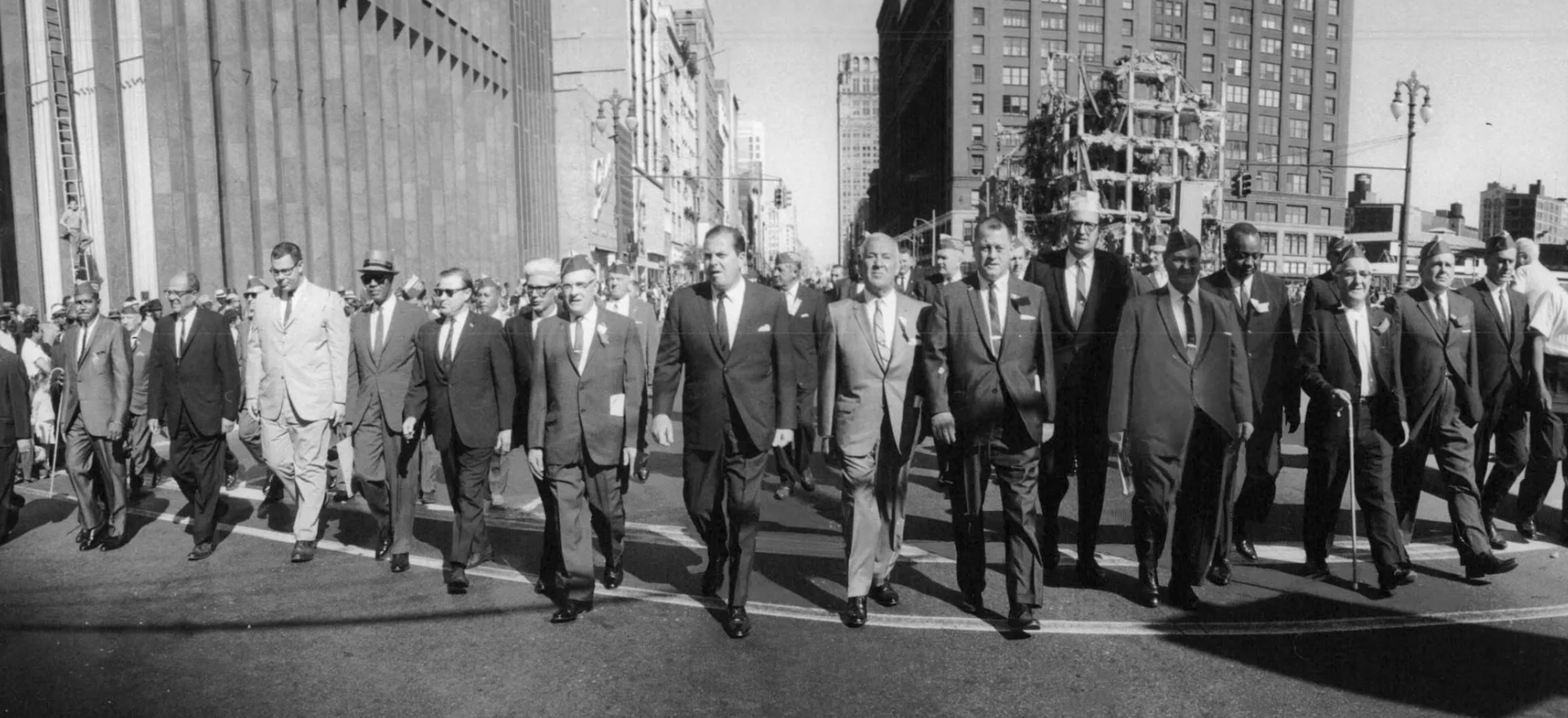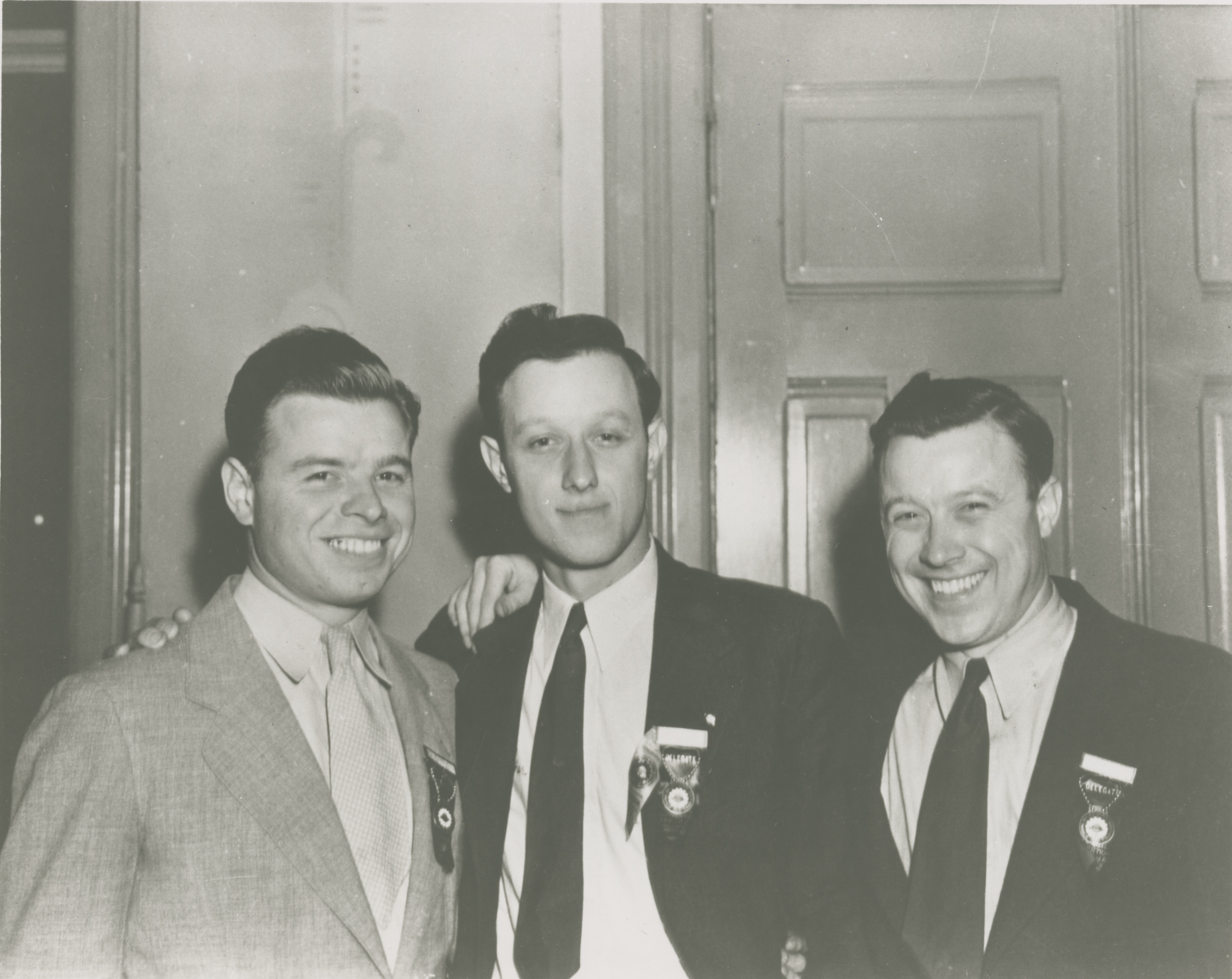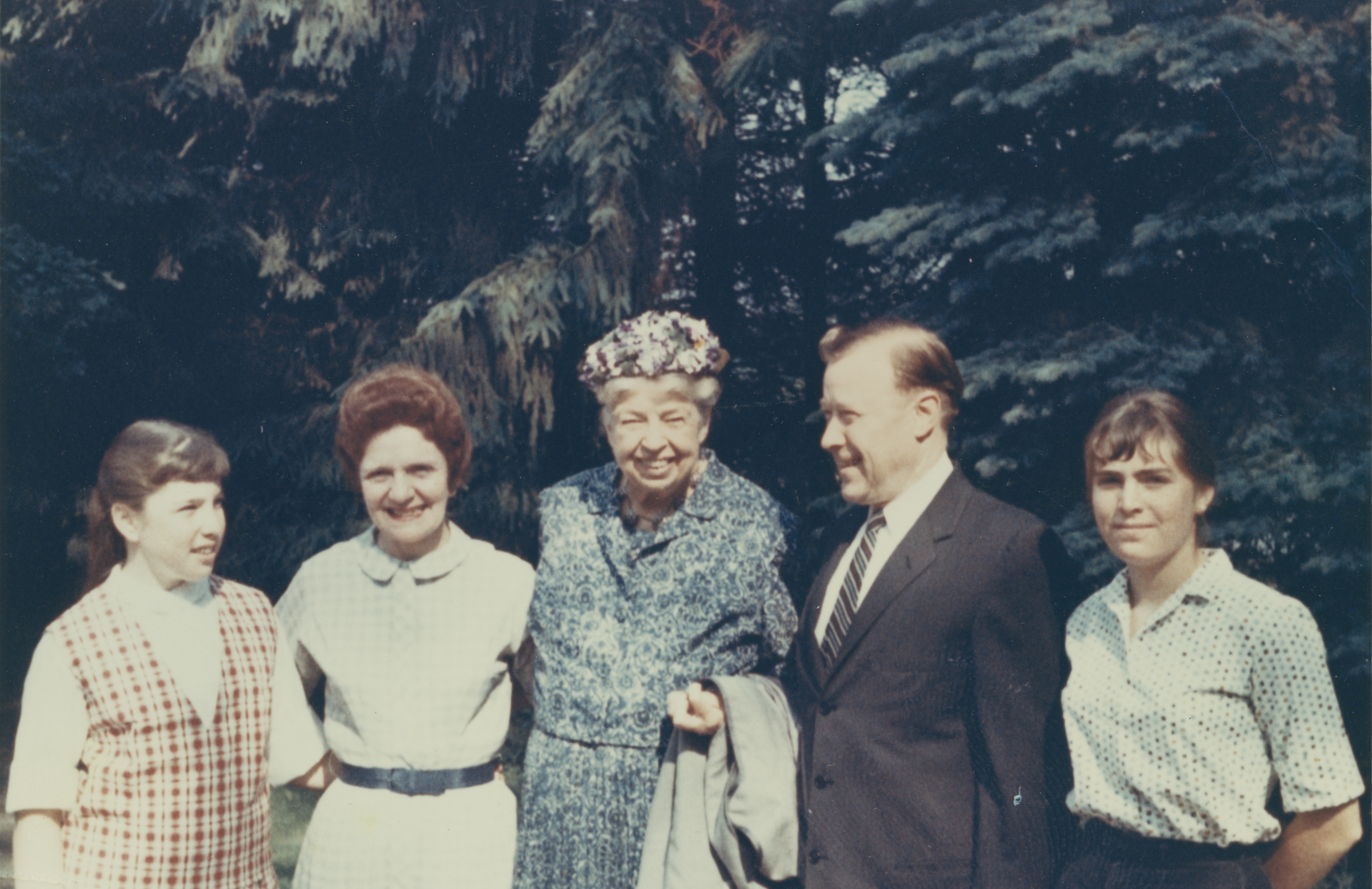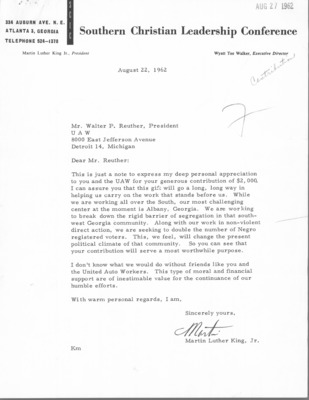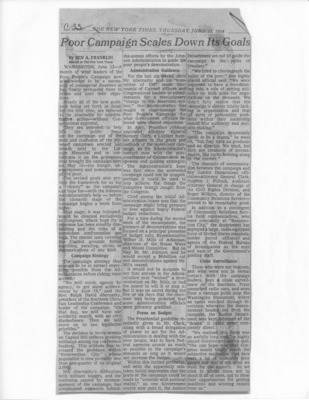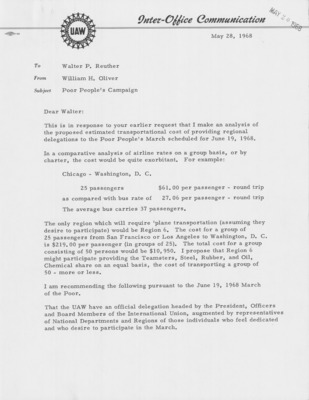United Automobile Worker
Item
- Title
- Date
- Alternative Title
- extracted text
-
United Automobile Worker
-
1949-08-01
-
Vol. 13 No. 8
-
ee
Y
7/7
Yy
Y
Gy
Uytip
Uf”
yo
YU
y
Yj
Ys
Vases
YWY>Yy
Yy D7
Yj
7/7
YyYj
7
J
7
g
y
je
Uy
YY
VOL. 13, NO. 8
La
AUGUST, 1949
MICHIGAN FORD WORKERS
CAST RECORD STRIKE VOTE.
Page
Big Chance-Vought
Three
Plant Goes UAW
Page Six
‘49 Convention Constructive, Democratic
Wf
Wii
WY)
Page 2
UNITED
AUTOMOBILE
WORKER
‘August, 1949
~ Twelfth Convention Constructive, Democratic
|
The UAW-CIO’s Twelfth Convention—called by delegates
““the most successful and constructive in the Union’s history’’—
ended last month with renewed and strengthened ‘‘teamwork in
Kx
the leadership and solidarity in the ranks.’’ It was the usual
UAW-CIO picture of democracy in action.
Public and press interest in
Twenty-one hundred delegates, representing the more than the affairs of
the UAW-CIO
million membership of the UAW-CIO, with only a tiny factional minority occasionally dissenting, laid down policies that Pres- continued high, ‘According to
ident Walter P. Reuther said ‘‘promised great achievement and Western Union officials, more
continued growth of our organization.’’
than 207,000 words were sent
Reuther
praised
the
delegates®
for their serious and diligent work.
tary
48
called
the
best-attended”
Convention
the}
yet,
ELECTIONS
of
Labor
the Presidents
Maurice
Tobin,
of the major
affiliated with the CIO,
and
unions
Mayor Frank Zeidler and GoyBy topheavy majorities the dele-|ernor Oscar Rennebohm welcomed
gates
re-elected
Reuther,
Secre- | the
delegates
to Milwaukee
and
tary-Treasurer
Emil
Mazey
and | Wisconsin.
by
wire
to
newspapers
press services by newsmen
ering the Convention.
and
cov-
KOK
Vice-Presidents Richard Gosser and |
Richard Gosser during the demonstration following his nomination for Vice-President by Congressman Thomas Burke, dele-|
gate from Local 12, Toledo.
—Acme Photo.
John W. Livingston. All Executive|
Board
members
were
re-elected
except in Regions 2 and 2A, where
Pat
O’Malley
replaced
Richard
Reisinger and Ray Ross replaced
Paul Miley. Harvey Kitzman, formerly
Assistant
Director of the
Agricultural
Implement
Depart|ment, was elected Director of Region 10, newly-created by a divi-
sion
of
Region
Convention.
4
ordered
the
major
by
the
COMMITTEES
Chairmen
of
Conven-
a
tion committees reported hundred
per cent attendance at all committee sessions. Chairman Ken Morris
of the Resolutions Committee made
ja typical statement, ‘The Committee met
daily and
put in much
time and effort.
I want to thank|
the other members
for their fine}
cooperation.”
Other
Committee
chairmen were:
Harry Southwell,
Local 174, Constitution; Willoughby
Abner, Local 734, Grievance; Robert A. Frost, Local 599, Credentials;
Walter Rood, Local 961, Officers’
Reports;
Robert
J. Chase,
Local
| 581, Rules; Arthur J. Valenti, Local
900, Union
Label;
Archie Rogers,
Local
396,
Competitive
Shops; |
| Charles E. Foster, Local
cation.
371, Edu*
GREETINGS
John W. Livingston also gets a ride. His nomination for
Vice-President by Blaine Marrin, Local 157, set off another long
demonstration.
—Press Picture Service,
Pz
Among
those sending
greetings
to the Convention were:
President
Truman,
President Philip Murray
of the
CIO, Senator
Hubert H.
Humphrey,
Chairman
of Americans for Democratic Action, Secre-
Local
212
members
shoulder Emil
Mazey
after their local
President, Ken Morris, had placed his name in nomination for
re-election as Secretary-Treasure r. Parades across the stage featured long demonstrations for all four officers.
rad.
The photographer caught this ‘shot just a few seconds
after Harry Southwell, President of Local 174, had d nomi-
nated Walter Reuther for re-election. This was the beginning
of a long demonstration. At upper left, a bunch of gas-filled
balloons are about to be released.. At lower left, Art Riordan
of the CIO News surveys the scene from the press table.
UNITED
Page 12
AUTOMOBILE
WORKER
August, 1949
“Gold-Plated Panhandlers” Like 50c Wage
UAW and IAM
Aircraft Wage;
¢
Rail Union Leader
A. F. Whitney Dies
One of labor’s stormy leaders
who fought reaction effectively
throughout his life, died suddenly last month. He was A. F.
Whitney, colorful president of
the Brotherhood of Railway
Trainmen.
At the time of his
untimely death, he was in the
midst of ambitious plans for
pitting the power of the rail:
Way unions against Ohio Senator Taft in-1950.
Starting as a “candy butcher” on
mid-western trains, Whitney later
KENNEDY
UAW RESOLUTION
Meeting last month
in
Milwau-
A common front for a $1.15 minimum wage in the aircraft
industry was formed by the UAW-CIO and the International
Association of Machinists in Labor Dept. hearings held in Washington last month. The nation’s two aircraft unions were met
by a chorus of protests from high-priced corporation lawyers
pleading for management’s right to set any wage it wants.
Under
kee, the UAW International Executive Board passed a special resolution praising Whitney’s contribution to the labor movement
and
stating that “the country and the
people
have
suffered
a profound
loss in the death of A. F. Whitney.
became
a brakeman
and rose
through the ranks of his union to
become
its national
president
in
1928. He was re-elected every four
years thereafter.
Join Forces to Boost
Corporations Squawk
“Brother Whitney’s dedication
to right and justice had the effect of moving his country and
its people further along toward
a better America and a better
labor movement.”
tract
57-year-old
William
Parker
Kennedy to the presidency.
Kennedy,
known as an indomitable foe of the
Taft-Hartley Act, announced that
his policies “are the same as Al
Whitney’s.”
Walsh-Healy
is compelled
by
law
to
Act
pay
any
company
wages
which
with
a government
will
not
“depress
con-
wages
and purchasing power.”
Today the aircraft industry is supported almost
entirely by federal money.
About 90 per cent of all aircraft
workers now receive wages of $1.15 or more, while the legal minimum
stays at only 50 cents an hour.
Reilly
Again
Gerald D. Reilly, the "$3,000-a-month
lobbyist for General Motors
who helped write the Taft-Hartley Act, told the Department of Labor
that businessmen should have the right to cut wages whenever they
desired.
“Tt was the dollars of the working people of America,” pointed
out Ralph Showalter of the UAW
Research Dept., that financed
90 per cent of the tremendous aircraft industry with war bonds
bought during the war. If there is any industry in the country in
which government has the clear responsibility of requiring honest
compliance
with the economic and social intent of the WalshHealy Act, the aircraft industry is the prime example.”
ELECTED
After
Whitney’s
funeral,
the
BRT’s board of directors elected
the
Both UAW
and IAM spokesmen termed the present minimum as
“ridiculous.” The legal minimum must be lifted, the union representatives insisted “because wage rates in the great bulk of the aircraft
industry have been raised through collective bargaining to $1.15 an
hour or more.”
recent Senate debate reached a new low.
The
occasion
amendment
Wyo.)
to
of
the
secret
Atomic
It
all
|ernment
tigation,
:
=k
(D.,
ap-
loyalty
receiving
gov-
It
one
lor,
D.,
Idaho).
Bottom
was
was
dissenting
when
Mich.)
BECOME
vote
in
“SO
LET
US
HYSTERICAL
CIVIL
RIGHTS
DIVIDUAL.”
He
OF
was
q7 \\
NOT
OVER
THE
replying
A
INto
an
impassioned
speech
for
civil
rights by Sen. Pepper
(D., Fla.)
who,
however,
voted
for
the
amendment.
TWO
VITAL
Under
(R.,
Tenn.),
os
:
Eight-year-old Pauline Georgi
goes back to her job of clearing tables at the CIO-FDR Memorial Camp for Children after
greeting Governor Williams
with a kiss. She is the daughter of Elsie
Georgi,
Research Department.
UAW-CIO
V———————
and
The
by
of
Axle,
Trans-
and
Hour
early
this
on
newly
the
Council
month
to
organized
council
studied
the
UAW-CIO
old
and
was
president
of
his
local union by the time he was 16.
He was active in the United Mine
Workers during many bitter struggles for recognition
and led organizing drives among
miners in
Kentucky, Tennessee, and Alabama
in the twenties.
MURRAY
FRIEND
Working
closely
with
Philip
Murray in the UMW, Mr. Bittner
became
a
vice-president
of
the
United Steelworkers after the drive
to organize steel began in 1936. He
was CIO organizing director in the
Great Lakes area and had charge
of organizing drives which brought
thousands
of steel
and
packinghouse workers into the ranks of
the CIO.
He was once heckled by an Atlanta
reporter
about
CIO
racial
policies.
Becoming
impatient, Mr.
Bittner blurted with the frankness
that endeared him to his associ-
ates:
conference
and
LEADER
charts
Re-
search Department
which showed
wage and hour gains made by the
union, and are used to win elections in open shops.
“At
a glance
the
Competitive
Shop Department of the UAW-CIO
may mean nothing to the average
wage earner in our branch of the
auto industry,”
one
of the delegates stated, “but to us it really
means the difference between the
starvation wages paid by the un-
if
“You
God
can
Negroes
they’re
say
are
in your
good
certainly
for the CIO. Now
something else.”
~ Allan
Swim,
paper
enough
good
let’s talk
editor
that
of
for
enough
about
the
CIO
News,
who
worked
closely
with
Mr. Bittner in the South
before
assuming his present job, has aptly
summarized Van Bittner’s outlook:
“Those of us who worked for or
with Van A. Bittner knew him as
a man
of many
talents—a
man
who believed democracy
was the
hope of the world and
that the
union movement was the backbone
of democracy.”
—<—$———
organized
shops
throughout
the
country and the wages paid by the
organized shops in the industry.”
RIGHTS
questioning
Ore.)
“H-m-m-m!... Strictly non-union
No backbone!”
Wage
reports
prepared
(R.,
Gear,
Toledo
plants.
de-
Ferguson
in
hear
Tay-
the
quarterly
National
met
with
(Sen.
reached
Sen.
said,
adopted
The
mission
funds for scientific inveswhether on secret or non-
only
THE
of an
Energy
requires
persons
work.
bate
approval
by Sen. O’Mahoney
propriation.
| tests
was
Gear, Axle Council
Meets in Toledo -
MINE
years
RIDICULOUS
WASHINGTON—Practically unnoticed in the press, the civil
rights of Americans subjected to loyalty. tests were hit again as
“The CIO lost a great organizer in the death of Van A.
Bittner on July 19. He died
following a prolonged illness
which began last spring. Until
his death, Van Bittner was director of the CIO Southern Ororganizing Drive and bore the
brunt of many reactionary 4ttacks on unionism in the South.
Bittner went into the coal mines
of Pennsylvania when he was 11
KEE-O TRIBE QUITS Even Liberals Help Deal
HUNTING GROUNDS
New Blow to Civil Rights —
The
Kee-O
Tribe —created by
CIO children campers at Port Huron
— packed
its Indian togs and
went home this month to resume
life with a trade union flavor.
More than 300 young squaws and
braves
blended
tribal ceremonies
with trade union living. The camp
was sponsored by the Detroit Recreational Council under the direction of Madeline
Schmid
of the
Detroit Federation of Teachers.
Campers held regular grievance
sessions
and
sang
union
songs.
Many colors, religions and nationalities were represented. Over 5,000
quarts of milk were consumed during the camp session.
Such notables as Michigan Governor
Williams
and
Detroit}
Council
Edwards
President
were
formally
installed
into
Kee-O}
membership after a camp visit.
VAN BITTNER, C10'S
GREAT ORGANIZER
Sen.
O’Mahoney
by
Sen.
Kefauver
made
Morse
(D.,
clear that
under the procedure of his amendment two vital civil rights are dispensed
with.
A
person
charged
with disloyalty need not be told
who accuses him, and if found disloyal by the Commission he shall
have
no
right
of appeal
to the
courts. Morse and Kefauver pleaded for these rights as necessary to
protect the reputations of persons
falsely accused.
But like the rest,
they went along.
POSTMASTER.
-Send notices of change
of address on Form 3578 (Canada, Form
67B)
and
copies
returned
under
labels
No. 3579 (Canada, labels No. 29B) to 2457
E. Washington St., Indianapolis 7, Ind,
pe
pO,
SEE
as
tenes aan
Te
Seti
og
NEW YORK—This is the general scene of melee as police attack pickets among the 1,300
UAW-CIO strikers at the Brooklyn plant of the American Machine and Foundry Company.
Four strikers were clubbed. The strikers have been out for 14 weeks.
- Item sets

